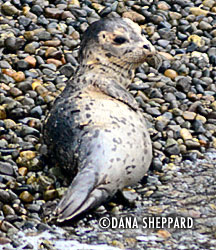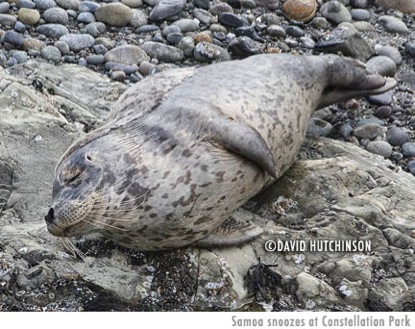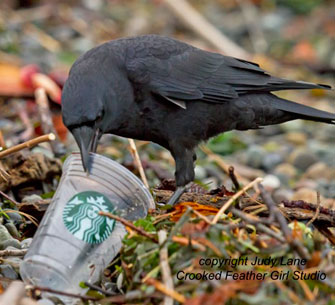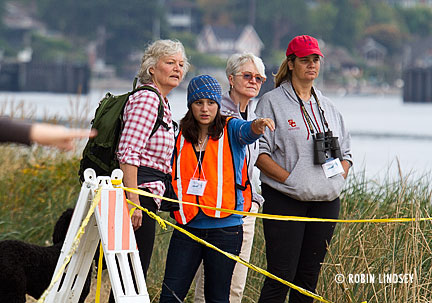Mar 2014
Quiet off season finally starts to heat up with Spring
Mar/23/14 04:57 AM
This has by far been the quietest off-season for Seal Sitters since the group formed over 7 years ago. Last winter and early Spring, we had lots of seal pup activity. Jack Block Park was a hotbed for harbor seals and the inaccessible abandoned dock there was loaded with up to 13 seals of all ages each day for months. The public access pier itself often had seal pups resting on the timbers accessed at high tide. Rehab Ruby and her pal Buddy fascinated onlookers with their friendship on a protected beach there. This year, however, there has only been occasional sightings of pups within the confines of the Park, swimming and foraging offshore.
 Last Sunday the 16th, however, a weaned harbor seal pup was discovered sleeping in the rain on a small beach below the sidewalk leading to Jack Block’s public beach. First responder for the day Dana stretched yellow tape and strategically placed cones and signs to add a small buffer zone above the pup. She observed the often-alert pup, nicknamed Neha (Hindu name for love, rain), over the next few hours. Due to inclement weather, there was little pedestrian traffic and the pup (shown at left) finally returned to Elliott Bay, but was later spotted stretching and yawning on the nearby, inaccessible dock.
Last Sunday the 16th, however, a weaned harbor seal pup was discovered sleeping in the rain on a small beach below the sidewalk leading to Jack Block’s public beach. First responder for the day Dana stretched yellow tape and strategically placed cones and signs to add a small buffer zone above the pup. She observed the often-alert pup, nicknamed Neha (Hindu name for love, rain), over the next few hours. Due to inclement weather, there was little pedestrian traffic and the pup (shown at left) finally returned to Elliott Bay, but was later spotted stretching and yawning on the nearby, inaccessible dock.
On the morning of March 12th, Seal Sitters’ dedicated hotline (206-905-7325) received a call of a pup on a private beach near the Harbor West Condos. First responder Lynn was on the scene within minutes and observed a reasonably robust pup (by wild-weaned standards) who exhibited a short coughing spell, not uncommon for weaned pups. Special thanks to homeowners Michelle and Renee for allowing volunteer access for health assessment and to close off one end of the beach at lower tide. Seal pups struggle through the long winter months and we appreciate all homeowners notifying us when a pup is on their beach. Nicknamed Samoa, the pup returned to the water overnight at high tide, but was sighted again on the afternoon of the 17th on the rocky beach at Constellation Park. Seal Sitters’ volunteers distributed small informational brochures and talked to a number of people out enjoying a pleasant afternoon strolling along Beach Drive’s waterfront. Samoa returned to Puget Sound around 5pm.
 Early morning of Sunday the 9th, a seal pup was noticed snoozing at the end of one of the docks at Don Armeni Boat Ramp. Access to the dock was blocked off with a barricade and volunteers spent a long day talking to the public about seal pups’ need to rest and warm up. The pup left the dock briefly when the launch of a sailboat created a disturbance. Minutes later, he hauled out to the same spot, settling back in for a rest. The pup was still there late at night, as volunteers did ‘round-the-clock checks on him. Early the next morning, first responders found “Clock” close to the same spot on the wooden ramp as the night before. Responders discussed the option of capture and transport to rehab, but his position just feet from the water posed a doubtful chance for a rescue; the pup was alert enough to be aware of events around him and anyone approaching down the long, narrow dock with a net. A decision was made to let the pup continue to rest rather than risk scaring him away from this safe haven.
Early morning of Sunday the 9th, a seal pup was noticed snoozing at the end of one of the docks at Don Armeni Boat Ramp. Access to the dock was blocked off with a barricade and volunteers spent a long day talking to the public about seal pups’ need to rest and warm up. The pup left the dock briefly when the launch of a sailboat created a disturbance. Minutes later, he hauled out to the same spot, settling back in for a rest. The pup was still there late at night, as volunteers did ‘round-the-clock checks on him. Early the next morning, first responders found “Clock” close to the same spot on the wooden ramp as the night before. Responders discussed the option of capture and transport to rehab, but his position just feet from the water posed a doubtful chance for a rescue; the pup was alert enough to be aware of events around him and anyone approaching down the long, narrow dock with a net. A decision was made to let the pup continue to rest rather than risk scaring him away from this safe haven.
However, the pup spent a second, very cold night on the dock. At 6am, first responders gathered in the darkness at Don Armeni to attempt a very challenging rescue. Upon approach, however, the awakening pup slid off his perch and disappeared into the black waters of Elliott Bay - our first unsuccessful rescue in 7 years. Volunteers kept an eye out for Clock throughout the day and evening, but he was not sighted again. We hope his refuge on shore allowed him the strength to forage and pack on some blubber.
Heartfelt thanks to the first responders and volunteers who protected these pups!

On the morning of March 12th, Seal Sitters’ dedicated hotline (206-905-7325) received a call of a pup on a private beach near the Harbor West Condos. First responder Lynn was on the scene within minutes and observed a reasonably robust pup (by wild-weaned standards) who exhibited a short coughing spell, not uncommon for weaned pups. Special thanks to homeowners Michelle and Renee for allowing volunteer access for health assessment and to close off one end of the beach at lower tide. Seal pups struggle through the long winter months and we appreciate all homeowners notifying us when a pup is on their beach. Nicknamed Samoa, the pup returned to the water overnight at high tide, but was sighted again on the afternoon of the 17th on the rocky beach at Constellation Park. Seal Sitters’ volunteers distributed small informational brochures and talked to a number of people out enjoying a pleasant afternoon strolling along Beach Drive’s waterfront. Samoa returned to Puget Sound around 5pm.

However, the pup spent a second, very cold night on the dock. At 6am, first responders gathered in the darkness at Don Armeni to attempt a very challenging rescue. Upon approach, however, the awakening pup slid off his perch and disappeared into the black waters of Elliott Bay - our first unsuccessful rescue in 7 years. Volunteers kept an eye out for Clock throughout the day and evening, but he was not sighted again. We hope his refuge on shore allowed him the strength to forage and pack on some blubber.
Heartfelt thanks to the first responders and volunteers who protected these pups!
Coming up: whale talk and beach cleanup
Mar/22/14 11:15 AM
Two great events are coming up this week, so make sure to get them on your calendar.
WHALE LECTURE
On Thursday evening, the 27th, The Whale Trail is hosting a talk entitled “Biology and Evolution of Whales: The Historic Return of Mammals to the Sea”. Why do whales and dolphins have finger bones in their flippers? Did you know that today’s cetacean’s are descended from ancestors who once lived on shore and then returned to the sea? Jim Kenagy, the Burke Museum’s curator of mammals and professor emeritus of biology at University of Washington, will enlighten us all on this fascinating subject.
Thursday, March 27, 7 - 9pm
C&P Coffee Company, 5612 California Ave SW, Seattle (map it)
$5 (kids for free)
Advance tickets: brownpapertickets.com
 BEACH CLEANUP
BEACH CLEANUP
The Whale Trail is also sponsoring a beach cleanup on Saturday, March 29, 10:30am - 2:30pm. You can sign up now at info@thewhaletrail.org or contact coordinator Judy Lane here. Volunteers will meet at the picnic table between Shelter 3 and 4 at Lincoln Park (map it).
Each year hundreds of thousands of seabirds, marine mammals and sea turtles are injured or killed by marine debris and pollution. Fishing line, plastic bands and bags and other debris strangle, suffocate and mutilate marine life. Too many a one-legged seagull is seen along West Seattle’s shoreline - a victim of amputation by derelict fishing line. Plastics, such as the cup shown here at Lincoln Park (image by Judy Lane), wind up in our waters and photo-degrade into minute particles, attracting pollutants such as PCB’s and flame retardants and enter into the food chain. Consumed by marine life, these pollutants cause deformation and immune disorders. Read more on about marine debris and pollution on Seal Sitters’ website.
Please volunteer some time on Saturday and help protect our marine mammals by removing dangerous trash from the beach!
WHALE LECTURE
On Thursday evening, the 27th, The Whale Trail is hosting a talk entitled “Biology and Evolution of Whales: The Historic Return of Mammals to the Sea”. Why do whales and dolphins have finger bones in their flippers? Did you know that today’s cetacean’s are descended from ancestors who once lived on shore and then returned to the sea? Jim Kenagy, the Burke Museum’s curator of mammals and professor emeritus of biology at University of Washington, will enlighten us all on this fascinating subject.
Thursday, March 27, 7 - 9pm
C&P Coffee Company, 5612 California Ave SW, Seattle (map it)
$5 (kids for free)
Advance tickets: brownpapertickets.com

The Whale Trail is also sponsoring a beach cleanup on Saturday, March 29, 10:30am - 2:30pm. You can sign up now at info@thewhaletrail.org or contact coordinator Judy Lane here. Volunteers will meet at the picnic table between Shelter 3 and 4 at Lincoln Park (map it).
Each year hundreds of thousands of seabirds, marine mammals and sea turtles are injured or killed by marine debris and pollution. Fishing line, plastic bands and bags and other debris strangle, suffocate and mutilate marine life. Too many a one-legged seagull is seen along West Seattle’s shoreline - a victim of amputation by derelict fishing line. Plastics, such as the cup shown here at Lincoln Park (image by Judy Lane), wind up in our waters and photo-degrade into minute particles, attracting pollutants such as PCB’s and flame retardants and enter into the food chain. Consumed by marine life, these pollutants cause deformation and immune disorders. Read more on about marine debris and pollution on Seal Sitters’ website.
Please volunteer some time on Saturday and help protect our marine mammals by removing dangerous trash from the beach!
Seal Sitters new volunteer training scheduled
Mar/20/14 07:15 AM

A multi-media presentation will illustrate our educational work in the community and the unique challenges of protecting seals and other marine mammals in an urban environment. Included in the training is an overview of NOAA's Western Marine Mammal Stranding Network and biology and behavior of seals and other pinnipeds (due to time frame, supplementary sessions will include more marine mammals of Puget Sound).
NEW VOLUNTEER TRAINING APRIL 26, 2014 SESSION
When: Saturday, April 26, 2014
Time: 10am - 12pm Training starts promptly at 10.
(weather permitting, a brief on-the beach short session will follow)
Where: Alki Bathhouse 2701 Alki Ave SW (map it)
RSVP required to assure seating.
If you are unable to make this training and would like to be placed on a contact list for future trainings or if you have any questions, please email us.







